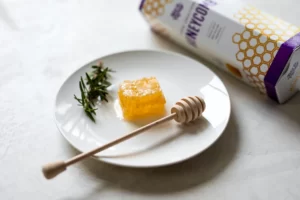Table of Contents
Honey has been used for centuries as a natural remedy for various ailments, and it continues to be a popular choice for treating minor injuries and conditions in households. From cuts and scrapes to burns and coughs, honey is known for its healing properties and is even gaining recognition in mainstream clinical practice, particularly for wound healing. Among the different types of honey available, manuka honey, in particular, has shown great promise for treating wounds.
How Does Manuka Honey Heal Wounds?
Manuka honey possesses several unique qualities that make it an effective treatment for wounds. It has strong bactericidal properties, meaning it can kill bacteria that may cause infections. Unlike traditional bandages, honey does not stick to healing tissue, making it easier to manage wounds. It is also less likely to cause allergic reactions compared to other wound dressings.
Moreover, manuka honey has been found to help prevent scarring and aids in the removal of debris from wounds. What sets manuka honey apart from other types of honey is its unusually high levels of antibacterial activity, which have shown effectiveness against antibiotic-resistant infections like MRSA.
It is important to note that each type of honey has a distinct constituent profile, which depends on its geographic location and the flowers the bees visited to collect nectar. While all honeys have healing potential, some may be more effective than others for treating specific conditions. Manuka honey, often referred to as “medical-grade” or “medicinal” honey, is known for its exceptional antibacterial properties.
The Healing Power of Manuka Honey
When it comes to using manuka honey for wounds, it is essential to seek medical advice, especially for deep wounds, infected wounds, or hard-to-heal wounds. Consulting with a doctor will ensure appropriate treatment and determine if manuka honey is suitable for your specific case.
For treating cuts or wounds, it is recommended to clean and pat dry the injured area before applying raw manuka honey directly. Alternatively, you can soak a strip of sterile gauze in honey or use bandages already impregnated with medicinal honey. Seal the wound with a sterile, waterproof tape, and if the wound oozes, change the dressing periodically. As the wound starts to dry out, you can leave the dressing on for the entire day.
If you have a sore throat or mouth sores, swirling a teaspoon of raw manuka honey in your mouth several times a day can provide relief. For cough suppression, you can sip on honey with lemon juice or consume a spoonful of raw manuka honey as needed. Additionally, for occasional mild heartburn or stomach upsets, sipping on honey can help alleviate symptoms.
When it comes to burns, medical-grade manuka honey should be used as directed for cuts and other wounds. However, it is important to note that the honey may initially cause a stinging sensation. If the pain persists or worsens, it is advisable to discontinue the honey treatment and seek medical attention, especially for large burns or charred skin.
For diaper rash, a combination of warm olive oil, beeswax, and manuka honey can be spread over the affected area. This mixture can help soothe and heal the rash.
Choosing the Right Manuka Honey
While most honeys available in supermarkets have undergone pasteurization and processing, which may diminish their beneficial properties, it is important to look for raw honey for healing purposes. Raw honey, both pasteurized and unpasteurized, contains the same nutrients, assuming they come from the same source.
For the best healing results, seek raw manuka honey from trusted sources such as local beekeepers or reputable brands that offer medical-grade honey. These honeys are often available online or in specialty stores and come in various forms, including jars, dressings, creams, gels, and ointments.
When selecting local honeys, experts suggest opting for darker varieties, as they tend to have higher healing potential.
Remember that while honey can be a beneficial natural remedy, it is crucial to consult a doctor before using it for certain wounds or conditions. Puncture wounds, deep wounds, infected wounds, and hard-to-heal wounds require professional evaluation and treatment.
In conclusion, manuka honey has shown great promise as a healing agent for various wounds. Its antibacterial properties, non-adhesive nature, and ability to prevent scarring make it a valuable option for wound care. However, always seek medical advice before using manuka honey or any other natural remedy for your specific condition.



